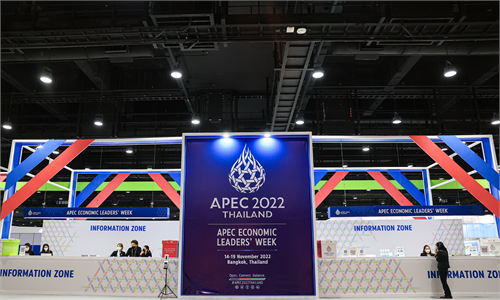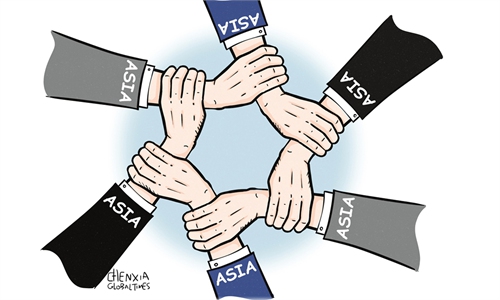
ASEAN Illustration: Chen Xia/GT
In a world that has been devastated by the COVID-19 pandemic and increasingly divided by sharp geopolitical tensions, the three multilateral meetings successively hosted by ASEAN countries in November carry special significance. Some pundits say the world has now entered the "Asian moment" as global leaders converge in ASEAN for the first face-to-face meeting since the outbreak of COVID-19 in January 2020.Cambodia hosted the ASEAN Summit and Leaders' Meetings on East Asia Cooperation from November 10-13 in its capital Phnom Penh with the theme "Stronger Together", followed by the G20 Summit in Bali, Indonesia with the theme "Recover Together, Recover Stronger". Next, Thailand will host the APEC Economic Leaders' Meeting, the last of the series of three multilateral meetings with the theme "Open. Connect. Balance" in Bangkok, from November 18-19, 2022.
The messages from the themes of these summits are loud and clear: The world must remain open, connected and together as it faces unprecedented turbulence and uncertainties since World War II.
The economic growth of Asia over the last half century has been nothing less than impressive. The total GDP of developing economies in Asia in 1970, excluding Japan and Israel, was just 10.9 percent of that of the advanced economies of Europe and North America. It jumped by almost 6 folds to 63.7 percent by 2019.
Asia is the keystone of global economic growth in the 21st century. According to the Asia Development Bank, Asia could account for half of global output, trade, and investment by the middle of the century. Asia's growth success, therefore, should rightfully be adequately translated into global governance.
The pandemic has disrupted the global supply chain and the Ukraine war further fragmented the world economy due to the harsh sanctions imposed by the US and its allies. The world, however, should not be binary, with countries taking side or forced to pick side. Bifurcation of the global economy will unquestionably retard recovery.
In a highly interconnected world, global economies are intricately interdependent, generating mutual benefits. The US and its allies should not view China-led Asia's rise through a geopolitical lens. The spirit of give-and-take and understanding for the greater good of the world is necessary to produce win-win outcomes. Economic or technological decoupling, as propagated by some western policy decision makers, would cause unthinkable backlash and benefit no one.
China and ASEAN are close neighbors with long historical ties. As the Chinese idiom goes, "The pavilion closest to the water enjoys moonlight first." ASEAN undoubtedly has benefited tremendously from China's miraculous economic success over the past 30 years due to its geographical proximity to the world's manufacturing powerhouse.
Despite the South China Sea dispute, China-ASEAN relations have remained cordial, stable and positive. Since China became ASEAN's first dialogue partner in 1991, trade between China and ASEAN has skyrocketed from $8.36 billion to $878.2 billion in 2021, an increase by more than 100 times in 30 years!
China has been ASEAN's biggest trading partner for 13 years consecutively since 2009. China and ASEAN are now the largest trading partners of each other. Their total trade volume is projected to reach $1 trillion this year, a record high and indeed a milestone in China-ASEAN trade relations.
The China-ASEAN Comprehensive Strategic Partnership and the recently announced China-ASEAN Joint Statement on Strengthening Common and Sustainable Development have laid the groundwork for a new era for China-ASEAN relations. The next 10 years will be the China- ASEAN golden decade. Coupled with the accelerated growth of India, the Asian Century appears imminent. It will not be surprising if India proclaims the arrival of the "Asian century" when it takes over the G20 presidency in 2023.
Unlike Western diplomacy which propagates Western democracy and human rights based on Western criteria as the sole bench marks, China and ASEAN countries have been able to accommodate their political, economical and cultural differences and subscribe to good neighborliness foreign policy by respecting and learning from each other in the interest of common good. This is a vivid manifestation of the Asian value of "harmony without uniformity", exemplary of international relations in a global order which is tinted with Western historical prejudices and biases.
On November 12, at the 10th annual US-ASEAN Summit in Phnom Penh, US and ASEAN upgraded their relationship to a Comprehensive Strategic Partnership, thus making ASEAN-US relations on par with ASEAN-China relations, in keeping with ASEAN's principle of centrality.
ASEAN does not wish to take side amidst big power rivalry. With its strategic position, geographically and geopolitically, and its increasing economic weight as a bloc, ASEAN is well placed to act as a bridge in a world fragmented by intense geopolitical competition. It is the bridge to a more open and connected world in the Asian moment!
The author is president of Center for New Inclusive Asia, a non-government Malaysian think tank. opinion@globaltimes.com.cn



